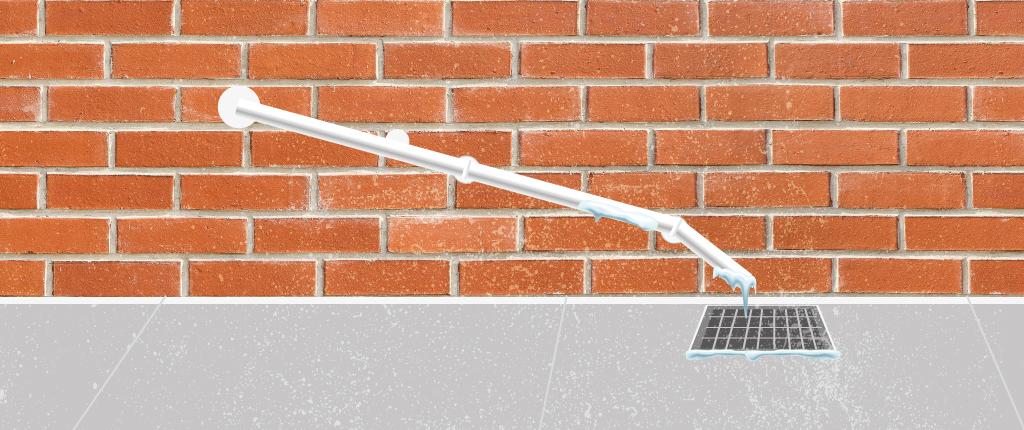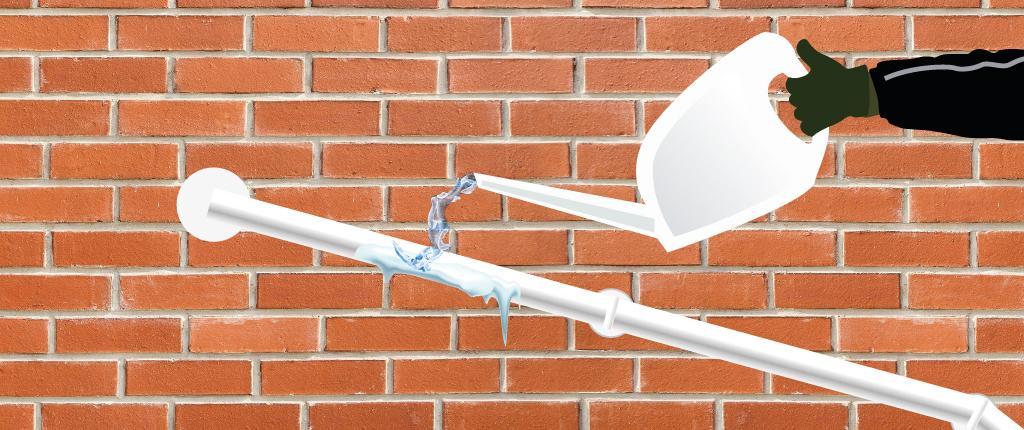How to Thaw a Frozen Condensate Pipe

Freezing cold weather can wreak havoc with your heating system.
One commom problem that we see time and time again is a frozen condensate pipe. The condensate pipe leads waste water away from the boiler and down a drain. Most are fitted internally but, in some cases, they have to be fitted outside, which can cause the pipe to freeze.
The good news is that you’re in the right place to find out how to thaw a frozen condensate pipe.
What is a condensate pipe?
Condensate pipes are found on condensing boilers. If you’ve had a new boiler fitted since April 2005, then you’re boiler will be condensing (this is when condensing boiler regulations were introduced).
If your boiler hasn’t been replaced since 2005 then it’s time to get a new boiler.
Anyway, the job of the condensate pipe is to move waste water away from the boiler and down a drain. This waste water is acidic and is made as the boiler recycles heat from the flue gases. This increases efficiency and is why all new boiler installations have to be condensing.
Why do condensate pipes freeze?
Outdoor condensate pipes are exposed to cold temperatures during the winter. This can cause the water in the pipe to freeze and form a blockage. At this point, the boiler will lockout to stop waste water from building up and flooding.
To help prevent the condensate pipe from freezing, the Heating & Hotwater Industry Council (HHIC) advise running the boiler at a higher temperature. This will lower the amount of condensate that forms, reducing the chances of the pipe freezing. However, this does mean that the radiators will be hotter and you’ll be paying more for the heating, so remember to turn the boiler thermostat down after the extremely cold weather has passed.
Finding the condensate pipe
The condensate pipe is the only plastic pipe at the bottom of your boiler. The others are all metal so finding the condensate pipe shouldn’t be too much trouble.
This pipe will lead outside and come out of the wall fairly low down, right above a drain.
Spotting a frozen condensate pipe
Before thawing a frozen condensate pipe, you need to ensure that's the cause of the fault. In many cases, your boiler will display an error code. But if your boiler doesn't, then it can often be recognised by a gurgling noise coming from your heating system.
If your boiler has been working well up until a period of below-freezing temperatures then that's a strong sign that the condensate pipe has frozen.
How do I thaw a condensate pipe?
If your condensate pipe has frozen, don't worry. It can be sorted in a few steps without having to contact a heating engineer.
Before you start, find the blocked part of the pipe. That way, you know you're thawing out the right part of the pipe. Most blockages happen if there’s bend or dip in the pipe.
Once you've located the blockage, there are several ways that you can unfreeze the condensate pipe:
- Hold a hot water bottle, microwaveable heating pack or warm cloth around the frozen part of the pipe.
- Pour hot water over the frozen part using a watering can – don't use boiling water as it could cause the plastic pipe to melt.
Watch out for any water on the floor as it can quickly freeze.

After unfreezing the pipe, you might need to reset the boiler to get it going again. Some boilers will do this automatically so it's best to take a look in your boiler's manual for next steps.
If you have any doubts, or don't feel confident enough to unfreeze the condensate pipe yourself, then you should contact a qualified heating engineer.
How to prevent a frozen condensate pipe
There are a few ways to help prevent your condensate pipe from freezing over in the first place. Take the following steps into account as we enter the colder months:
- Use foam pipe insulation to cover the condensate pipe;
- Leave your heating on overnight to keep the condensate pipe warm; and
- Turn the thermostat up to a higher temperature to reduce the amount of condensate (but watch out for hot radiators).
There are also some condensate pipe regulations that have to be followed when they're fitted outside:
- Pipe has to take the shortest route
- Diameter of the pipe must be 32mm
- Insulate with external grade PVC coated insulation
- End of the pipe must be as close to the drain as possible
To combat the condensate pipes on their condensing boilers freezing, Worcester Bosch have launched CondenseSure. This device can be fitted to Worcester Bosch boilers during a new installation or retrofit, including their Greenstar range, and can prevent the condensate pipe from freezing in temperatures as low as -15°C.
Boiler condensate pipe insulation
By insulating the condensate pipe, it will help to prevent it from freezing. This can be done yourself and condensate freeze protection kits are available, but you can always contact a heating engineer to carry out the insulation.
Frozen condensate pipe error codes
Several boilers will display an error code when the condensate pipe has frozen to make you aware of the issue. Use the table below to find out the error code your boiler will display.
| Manufacturer | Error Code |
|---|---|
| ATAG | 133 |
| Baxi | E133 or E28 |
| Glow-worm | F1, F4, F28 or F29 |
| Main | E133 |
| Potterton | E133 |
| Vaillant | F28 or F29 |
| Viessmann | F4EE |
| Worcester Bosch | EA229 D5 |
If your boiler manufacturer isn't listed above, take a look in the boiler manual or get an engineer to check things over.



